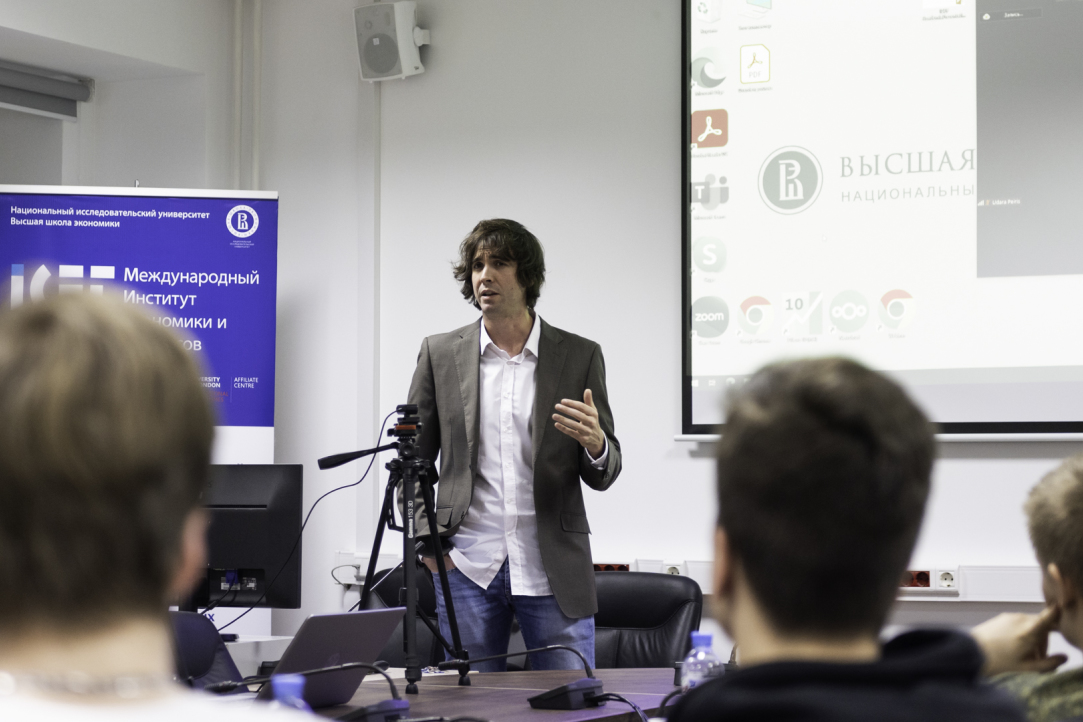ICEF Academia Welcomes New Cohort at Presentation Meeting

ICEF Academia offers its students advanced courses, research opportunities, access to scientific debate, and more in-depth training for academic careers. Its courses are taken alongside core curriculum. Presenting ICEF Academia to the new cohort of students were its leaders, teachers, and ICEF graduate Andrey Voronin, who shared his experience of gaining admission to PhD programme at UCLA (USA).
The meeting was opened by Oleg Zamkov, ICEF Bachelor’s Programme Academic Supervisor. Referring to ICEF Academia’s ten years of successful operation, Oleg Zamkov introduced the students to its history and mission, the latter consisting in providing learners with more knowledge than offered by their bachelor’s curriculum, bringing interdisciplinarity and teaching how to conduct research.
Every year, ICEF Academia awards its best performing students with trips to LSE Summer School. The brightest students of the 2021-2022 academic year are Timofey Lomakin (year 2) and Alisa Vakhitova (year 3). They will go to LSE next year, when the British embassy resumes issuing visas to Russian students. Oleg Zamkov congratulated the students and awarded them with memorable gifts and certificates of achievement in recognition of their excellence. “ICEF Academia will give you access to the best researchers in your field. Its courses are an excellent add-on to your core curriculum,” underlined Oleg Zamkov.
ICEF Associate Professor Udara Peiris, who chairs ICEF Academia Committee, told more about the history of ICEF Academia and gave details of its Advanced Research Programme (ARP). ARP allows students to present their research papers for review and receive useful feedback. “We strongly encourage students to pursue research because no matter what they choose to do after graduation – enter the workplace or start a PhD – their researcher skills will be equally important,” said Udara. Coupled with professional communication, skills like argumentation, proper use of analytical tools, concept deconstruction and interpreting statistics are all part of workplace success. These skills can be learned by doing the ICEF Academia courses.
“ICEF Academia is a fantastic programme. You are truly lucky indeed to be its students, and as such you can be sure you will always be one step ahead of the competition,” added Udara Peiris. Udara continued by showcasing the writing samples, cover letters and techniques to advantageously present one’s research experience when applying for a master’s degree or PhD programme or job – the skills taught at ICEF Academia will definitely benefit students’ further careers.
Peio Zuazo-Garin, associate professor at ICEF and ICEF Academia Academic Supervisor, took the floor next. Peio shared his thoughts about ICEF Academia, mentioning that the academic training as solid and comprehensive as at ICEF is hard to find elsewhere. ICEF Academia gives a profound grounding in research approach. “Here, you will get acquainted with the methodology and stages of research development and, what is more, learn research philosophy through the lens of social sciences, which is what underlies research approach,” said Peio. Beyond that, as the line between business studies and academic research becomes increasingly blurred, ICEF Academia provides hands-on skills such as data analysis. Employers tend to be increasingly interested in analysts with academic experience, and almost every large company has a research department.
The curriculum of ICEF Academia is administered by Natalia Arkhipova and Natalia Kogutovskaya. They gave details of the advanced courses to be taken and explained how students would be able to communicate with academia, what to expect from the LSE Summer School, how ICEF Academia prepares for admission to PhD programmes, and how students can benefit from access to lectures, conferences, including Student Research Conference, as well as unique publications and seminars.
Geng Rungjie, assistant professor in Finance at ICEF, spoke about his study into general equilibrium models with bounded rational agents and how these can assist in economic predictions and agents’ decision-making, while Peio Zuazo-Garin presented game theory, explaining its role in social communications and how it links to mathematical modeling to explain behavioral phenomena, one being the paradox of choice.
Professor Olga Kuzina of the Faculty of Social Sciences presented her course Social Science Thinking and Research, designed to broaden students’ understanding of economics by equipping them with methodologies available in social sciences. Professor Kuzina’s course is two-part. Part one teaches data analysis techniques and how to conduct sociological research; part two deals with cultivating economic intuition and critical thinking approach when dealing with research tasks. Overall, the course teaches to observe and consider economic problems through the lens of social studies, psychology and anthropology. It also teaches how to work with data sources and academic literature.
Yaroslav Lyulko presented his course in Statistics, providing evidence of how it can help students with their core curriculum and courses such as Mathematical Finance, Statistical Analysis and, particularly, Econometrics, the latter being fundamental to the finance majors’ competency. Yaroslav advised students who wish to excel in quantitative analysis to focus more on mathematics courses, as these can help to master coding and engineering fields in the future. In addition, Yaroslav’s course, teaches data management skills.
Concluding the meeting was Andrey Voronin, who graduated from ICEF in 2022 with a bachelor’s degree and is currently doing a PhD at the University of California, Los Angeles (USA).
Andrey’s presentation took the form of Q&A and answered questions such as how to prepare for admission and produce a solid piece of research work. Andrey mentioned the importance of references – these can be obtained from ICEF Academia teachers – and advised on how early one should start preparing for admission, who at ICEF to ask for advice and support, and how one can make their academic portfolio look more impressive. When asked how to best prepare for a career in academia, Andrey shared tips on getting things right in one’s first year at ICEF, recommending ICEF Academia and its courses as best option.
Udara Peiris
Peio Zuazo-Garin